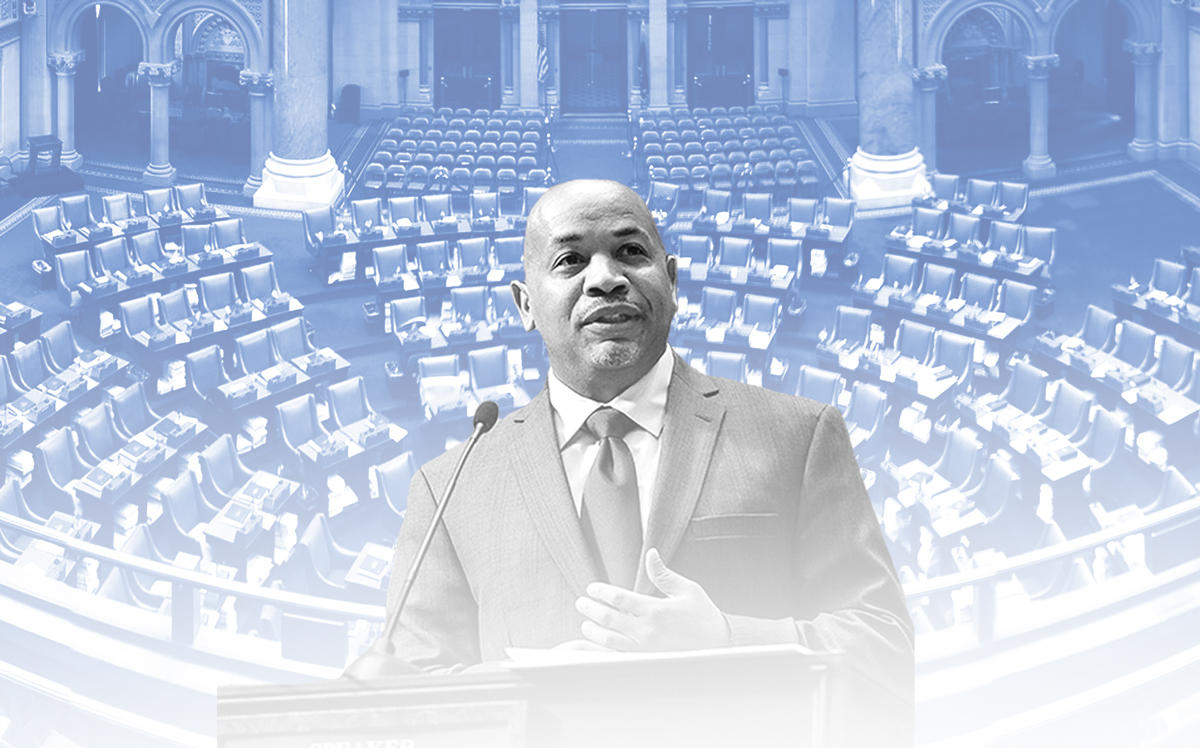 Carl Heastie’s BFFs
Carl Heastie’s BFFs
Trending
Real estate’s nemesis may now be its best hope in Albany
Assembly Speaker Carl Heastie’s inner circle gives industry reason for optimism

The New York State Assembly for years passed tenant-friendly bills, and the Senate killed them. But now the Assembly — and its speaker, Carl Heastie — may represent the real estate industry’s best chance in Albany.
With the Senate lurching from the Assembly’s right flank to its left last session, and Gov. Andrew Cuomo’s priorities shifting, what had long been dead-end legislation started reaching the governor’s desk — and getting signed. When the legislature reconvenes next month, other measures anathema to property owners, such as “good cause” eviction, are liable to pass.
Given that dynamic, Heastie’s numerous ties to real estate may give some in the industry comfort — especially after their unexpected falling out with Gov. Andrew Cuomo earlier this year.
In March, Heastie told a Crain’s New York Business audience that while the city has become nearly unaffordable, he didn’t want to have the pendulum swing “all the way back to the other side” with legislation that would “disincentivize” landlords from investing in their properties. Although owners were deeply disappointed with the bargain he struck three months later, he did preserve their ability to recover some investments through rent hikes.
Moreover, some of Heastie’s longest and closest relationships are with lobbyists who have deep industry ties and are stalwarts of the Bronx Democratic organization he led until becoming speaker. Lobbyists Stanley Schlein, Roberto Ramírez and Patrick Jenkins — all close advisers to Heastie — are regularly hired by prominent developers and real estate trade groups.
Learn more about Heastieu2019s relationships with lobbyists
 Carl Heastie’s BFFs
Carl Heastie’s BFFs
Another reason for the industry to turn to Heastie is the perception that he can steer Assembly Democrats to a greater degree than his Senate counterpart, Andrea Stewart-Cousins, can corral her members.
“Heastie is in much more control of his conference than Stewart-Cousins is,” said Joe Strasburg, president of the Rent Stabilization Association, which represents owners of rent-stabilized properties.
According to multiple sources, Heastie was also irritated that strategies used by progressive lawmakers to advance tenant-friendly legislation were reported by TRD. The speaker chastised some of his members for telling activists what was said during Democratic conference meetings, which violated long-standing protocol.
“If you don’t feel you can have an open and honest debate in conference, people keep their thoughts in confidence, or people go directly to the leadership to express their viewpoint,” Strasburg said.
In the next session, the Assembly will examine a number of measures that the industry hopes to block. Good-cause eviction, taxes on the wealthy and a further tightening of rent regulations all stand to be furthered or defeated in the lower chamber.
Good-cause eviction, State Sen. Julia Salazar’s signature legislation, would restrict rent increases for virtually all housing — even unregulated units. The measure is so sweeping that critics and advocates alike have called it “universal rent control.” It has 25 sponsors in the Senate, although upstate legislators have said it faces an uphill battle to get support outside of New York City.
Though Heastie does not share the profile of the young political novices who are hoping to shake things up in Albany, he may nevertheless end up supporting the left’s legislative priorities. Even long ties to real estate might not be enough to prevent the passage of progressive-backed bills. Heastie’s recent remarks signal that he, too, is responding to pressures from the left.
Last week, addressing the need to close a projected $6.1 billion budget deficit by April, Heastie said he would prefer to increase taxes than cut services such as Medicaid. Advocates saw the statement as a positive response to their calls for a pied-à-terre tax and to “make billionaire’s pay” for their $10 billion dollar housing agenda. Observers in the real estate industry were alarmed.
“For us in the Assembly, we would always rather raise revenues than cut,” Heastie told reporters. “We think New York has some very generous people, and I’m saying that facetiously, that we would always like to call on them to do more in that regard instead of cutting health care or denying health care.”
Moreover, having close allies and confidants with ties to real estate did not stop Heastie in June from supporting rent reforms the industry hated. Industry lobbyists say they do not have the luxury of assuming even more radical measures such as the eviction bill won’t pass.
Advocates are keeping the pressure on. In the June Democratic primary they are backing insurgent candidates — dubbed by one advocate as the “good cause” slate — with the aim of shifting the Assembly’s politics as much as the Senate’s were by the 2018 election.
“The Assembly will be very interesting in terms of elections. There are some people who have a very uphill fight in insurgent districts in Queens and Brooklyn,” said Strasburg. “We’ll see whether [voters] have had enough [of left-wing candidates] or if momentum is still continuing.”
But the threat could lead incumbents to take positions this winter and spring that appeal to tenant groups.
“They could once again just dare the governor to veto legislation and put the political albatross around his neck,” said Jay Martin, executive director of the Community Housing Improvement Program.
Heastie, Ramos, Schlein, Ramírez and Jenkins did not respond to requests for comment.




